His synagogue barred him because he’s gay. Now, he protests outside each Shabbat.
‘I just want a shul where everyone who is Jewish is welcome,’ says Brian Mandel, a social worker.
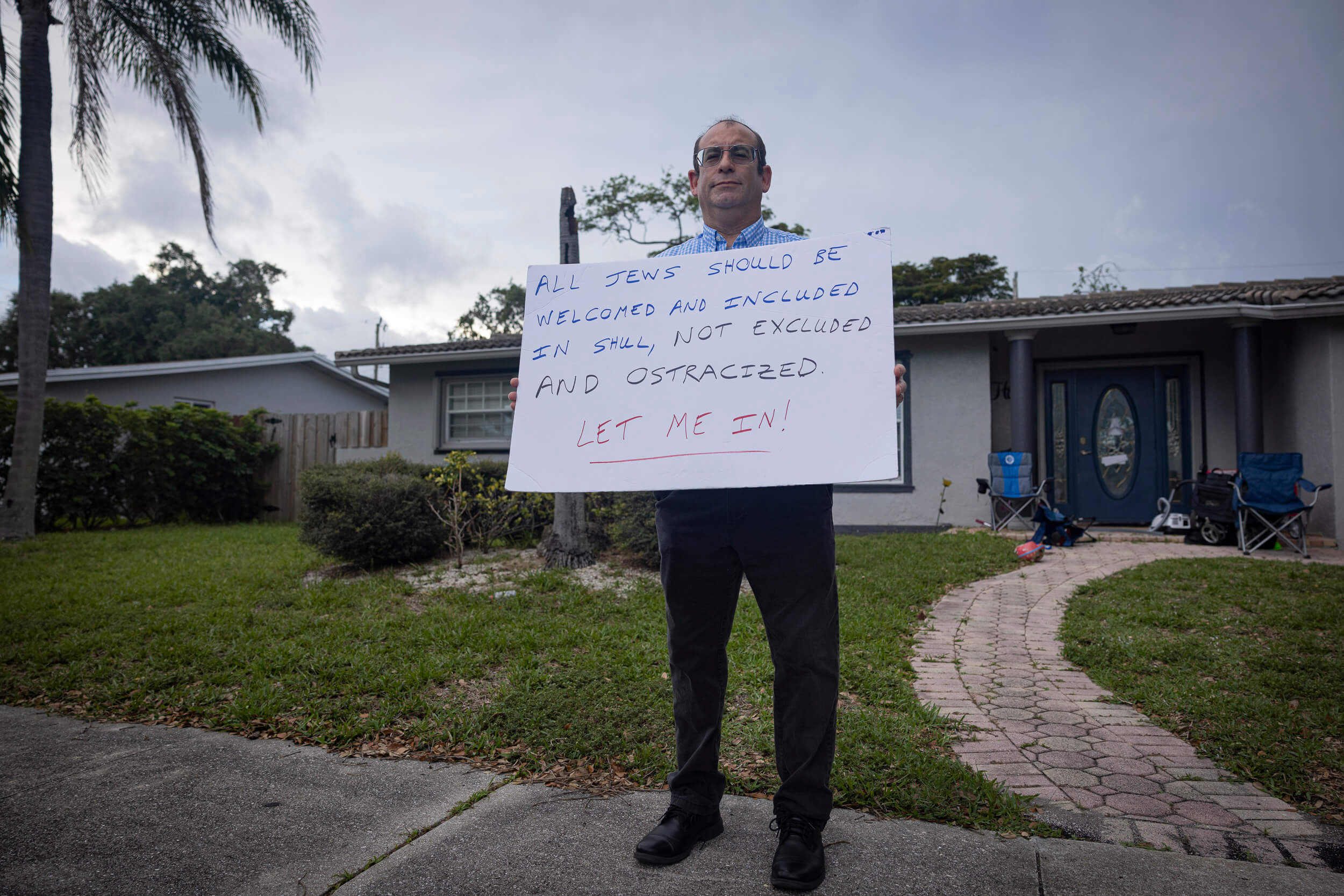
Graphic by Angelie Zaslavsky
Kehillas Hollywood Hills bills itself as a “young, vibrant, warm” Orthodox congregation in South Florida.
But every Shabbat since late January, a man has been protesting outside its doors, saying the synagogue’s rabbi banned him because he’s gay. “You have spiritually and religiously killed me,” reads one of his handwritten signs.
Brian Mandel and his husband of 10 years started attending Kehillas Hollywood Hills in the fall of 2021, a few weeks after its inception in the home of Rabbi Binyamin Brodman, a high school Judaic studies teacher. In those early days, the couple often helped make the minyan, the quorum of 10 required for communal prayer, and Mandel joined the rotation of men who chant Torah, something he has loved doing since his bar mitzvah four decades ago.
“I feel the closest to God when I lein,” Mandel said, using the Yiddish term. “When I’m leining, I’m leining for the community, but it’s like almost as though there’s no one else there — just me and Hashem.”
Because the Torah forbids male gay sex, homosexuality has long been a fractious issue in the Orthodox world, and Mandel is hardly alone among queer Jews struggling to find a spiritual home. While an ongoing survey by Eshel, a group that advocates for LGBTQ+ inclusion, has found hundreds of Orthodox rabbis who aspire to welcome queer members, several recent high-profile cases show there remain large pockets of discomfort.
A transgender woman was ousted from her teaching job at a Brooklyn yeshiva in September and in January said that her family was asked to leave Shenk Shul, a modern Orthodox synagogue in Upper Manhattan affiliated with Yeshiva University. The university has been embroiled in a legal battle over its refusal to recognize an LGBTQ+ student club.
And in 2019, a rabbinical student was asked to leave an Orthodox seminary the day after his boyfriend proposed to him at a pop concert. (Rabbi Daniel Atwood was later ordained by an Orthodox institution in Jerusalem.)
Rabbi Avi Shafran of Agudath Israel of North America, a Haredi Orthodox umbrella organization, said a synagogue’s decision to restrict LGBTQ+ attendance was “not a matter of anti-gay sentiment but rather pro-halacha standards.”
“Two men living as man and spouse implies the violation of a very serious Torah law,” Shafran said in an email.
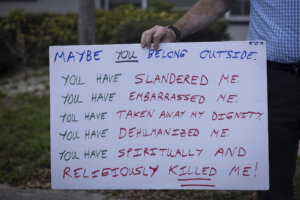
Mandel and his husband, who asked not to be named for fear of being shunned from other shuls, were well aware of this sentiment, having quit an Orthodox synagogue on Long Island, in New York, years ago after a confrontation with an anti-gay guest speaker. So while they wore their wedding rings to shul, they did not tell the rabbi or fellow synagogue attendees that they were a couple. Whenever someone asked how the two were related, Mandel said, they would say they were roommates and best friends.
Mandel, 53, had struggled to find a synagogue that suited him since moving to South Florida in 2018. There is an Orthodox shul about 2 miles from his home, but he has diabetes and neuropathy in his feet, so the long walk on Shabbat was painful. There is a Conservative congregation closer by, but it was slow to resume in-person services during the pandemic, and does not read the entire Torah portion each week, which Mandel — an Orthodox Jew who believes in divine authorship of the Torah — prefers.
So when Kehillas Hollywood Hills opened around Labor Day in 2021 only a few blocks from Mandel’s home, it felt like a godsend. But after more than a year of regularly attending services, he said, Rabbi Brodman told him on Jan. 9 that some members had expressed discomfort with the couple’s presence, and that after consulting with his own rabbi, he had decided to bar them from services.
Brodman, who teaches at a local Orthodox high school and is originally from Detroit, declined to discuss the situation when reached by telephone. So did the assistant rabbi and two board members of the small congregation.
Mandel returned to Kehillas Hollywood Hills on Jan. 21, this time with a sign. Thus began his weekly vigil, perched on a footstool 20 feet from where his former shul-mates are reciting the Shabbat prayers. “I AM A JEW WHO WISHES TO DAVEN AND LEIN TORAH,” one of his signs says. “THIS IS NOT A CRIME.”
“I just want a shul where everyone who’s Jewish is welcome,” Mandel told me in a series of conversations last month. “To me it’s a simple matter: I’m a Jew. Where do I belong on Shabbos if not shul?”
‘A standard modern Orthodox life’
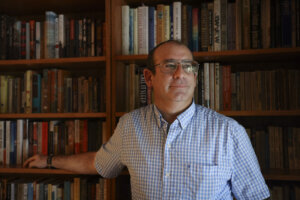
As a teenager on Long Island, Mandel felt he was different from the other boys in his modern Orthodox high school, but wasn’t sure how. As an undergraduate at Hebrew University in Jerusalem, he realized he was gay. He later earned master’s degrees in social work and Jewish studies at Columbia and the Jewish Theological Seminary; today, he does social work part time while he studies to be a nurse.
Mandel met his husband, who also grew up frum and who had remained closeted as a student at Yeshiva University, at an Orthodox synagogue in Queens, New York, in 1995. Their families did not accept their relationship easily; Mandel was not sure his parents would attend their 2012 wedding until he saw them there. (They walked him down the aisle.)
Together the couple built what Mandel called “a standard modern Orthodox life” in West Hempstead, a Long Island hamlet of about 20,000 people that is home to at least seven Orthodox shuls.
They observed Shabbat and kept kosher. They accumulated books and brought cans of tuna on vacation. After Mandel’s husband — a former government worker with a green thumb — retired, the couple moved to Hollywood, where their backyard garden yields mangoes and avocados in the summer and tomatoes and peppers in winter.
While strict interpretations of Jewish law forbid gay sex and most large Orthodox institutions openly oppose same-sex marriage, there is a growing recognition in parts of the Orthodox world that queer Jews are an inevitable part of the community fabric. Over the past decade or more, individual synagogues have grappled with how best to accommodate this reality, as more Orthodox Jews have publicly identified as LGBTQ+ and groups like Eshel and JQY — which supports queer Orthodox youth — have emerged to support them.
In 2016, an Orthodox high school in Los Angeles adopted a nondiscrimination pledge for LGBTQ+ students. Even Yeshiva University, which asked the Supreme Court last year to let it block an existing campus Pride club, has offered to create a new one under its own auspices.
A white paper published last month by Rabbi Kenneth Brander, an Orthodox American-Israeli rabbi who founded the Miami yeshiva high school that now employs Brodman, asserted that LGBTQ+ Jews should be allowed to teach in yeshivas and be members of Orthodox synagogues as long as they are not sexually active.
And in more than a few Orthodox synagogues, gay men are called up for ritual honors like any other congregants, and “family” memberships have become “household” memberships.
“In a glacial environment, there’s been real movement,” said Miryam Kabakov, co-founder and executive director of Eshel, which offers a dating site, parent support groups and retreats as well as Torah study resources. “People’s language is different. Everyone is taking it seriously.”
But that movement is hardly universal, and experts say many LGBTQ+ Orthodox Jews who feel rejected by their community give up being observant or are alienated from the religion altogether. Or worse: A 2012 study by the Israeli health ministry found that 20% of LGBTQ+ youth had attempted suicide, compared to 3.5% for the general youth population, with the lead researcher stating that the number was higher among the Orthodox. JQY Executive Director Rachael Fried wrote in a 2020 column that nearly 3 out of 4 teens who come to the nonprofit’s drop-in center have “experienced suicidality.”
Mandel said that after his shunning from Kehillas Hollywood Hills, he thought about intentionally overdosing on insulin.
“I just said, like, what am I living for?” he explained. “I just thought about it. I didn’t do it. But I said, ‘I’m going to. Unless I do something, I’m gonna kill myself.’ So I said to myself: Fight back.”
One of the signs he holds outside the synagogue on Shabbat asks, in black and red marker: “HOW MANY LGBT JEWS NEED TO LEAVE ORTHODOX JUDAISM OR DIE BEFORE YOU CARE?”
‘A serious violation’
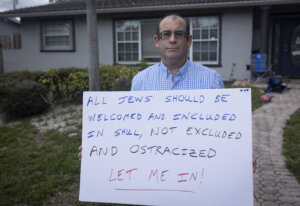
Hollywood Hills is not the first place Mandel and his husband have felt tension between their sexual and religious identities. They both said they would have been content to keep their relationship low profile in Orthodox spaces, but at times Mandel has felt pushed to speak out.
A few years before they moved to Florida, Mandel said, a guest speaker at a Long Island synagogue where the couple had been congregants for years ranted about the decline of family values with such apparent contempt for gay people that Mandel, seated in the pews, rose to cut him off. (The couple shared this story on the condition that the synagogue not be identified because they still have relatives in the area.)
“I said, ‘I didn’t come to shul for this. I’m gay. I am happily married to my husband,’” Mandel recalled. “And I stormed out.”
That synagogue’s rabbi, who was not leading the shul at the time, said he was unaware of the incident.
The couple said they quit the shul and headed to a different Orthodox synagogue in the area. But at the new shul, Mandel said, his husband was informed he would not be able to lead services on the anniversary of his parents’ death, as is traditional, because of what had happened. That synagogue’s then-rabbi, who is no longer employed there, could not be reached for comment.
There is no halacha, or Jewish law, restricting same-sex attraction. But the Leviticus verse prohibiting two men from having sex calls the act a to’eiva, often translated as “abhorrence” or “abomination.” To some Orthodox leaders, then, recognizing queer Jews in any way is tantamount to endorsing the worst kind of sin.
To those advocating LGBTQ+ inclusion, though, this is irrelevant. Whatever the halachic challenges around homosexuality may be, they say, the prevailing task of a synagogue is not to regulate its members’ observance of Torah and mitzvot, but to facilitate it.
They note that most modern Orthodox synagogues do not investigate members’ or attendees’ observance of other aspects of Jewish law.
Jews who drive on Shabbat, for example, are seldom if ever barred from shul membership, let alone weekly services. Rabbis do not check to see if female members are following the purity protocols around menstruation, or spot-check people’s kitchens for kashrut violations.
“They don’t know anything that takes place in our home,” Mandel said. “They don’t know anything about us. They were all talking about us instead of talking to us, and making all these assumptions.
“We know what the prohibitions are, we both come from learned backgrounds, and none of that matters,” he added. “Just because of the fact that we’re gay, we’re excluded.”
‘Don’t ask, don’t tell’
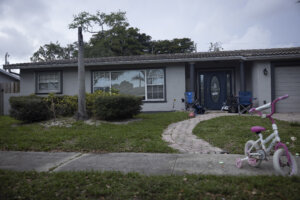
While the couple’s relationship may not have been clear to all at the shul, Mandel said that Rabbi Brodman seemed aware of it.
“Out of the blue one time as we were leaving services, the rabbi said to us, ‘I just want you guys to know that you will always be welcome here,’” Mandel recalled of one early Shabbat. “So even though we didn’t come right out and say it, with our rings and the fact that we didn’t mention wives, and we live together, I figured it’s like a ‘Don’t ask, don’t tell’ situation.”
That’s why he was blindsided when the rabbi asked him to meet with him that January day, and then announced he would no longer be welcome. Mandel said Brodman told him that the rabbi he consulted had initially given approval for the couple’s attendance — back when the synagogue was in its infancy — but was now rescinding it.
Mandel said that Brodman would not disclose which members had complained about the couple’s presence. “He kept saying that if it was his decision, he would allow it,” Mandel said. “He kept saying, ‘People suck’ — he said that a few times. And I’m like, ‘But you’re going along with that.’”
On a subsequent phone call, the synagogue’s assistant rabbi, Rabbi Yehuda Goldfarb, took a different tack, Mandel says: “He called us ‘public desecrators’ of the Torah.”
Goldfarb declined to comment to the Forward.
Mandel showed me screenshots of text messages he exchanged with Brodman later that week. If the rabbi was saying he could no longer pray with a minyan, Mandel asked provocatively, should he also stop wearing a kippah and tzitzit? Eat non-kosher food? Go to church? Should he advise Jewish people who don’t know he’s gay to avert their eyes?
“I’m sorry, believe me when I know that you’re understandably hurt,” Brodman texted back. “I really meant it when I said that we could stay in touch.”
Mandel said he has sent other messages since, and a few weeks ago, he printed Brander’s 28-page treatise on queer inclusion and dropped it in Brodman’s mailbox with a note. He says Brodman has never responded.
The lone protester
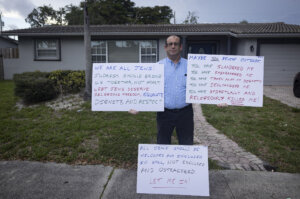
Each Shabbat, and on Jewish holidays, Mandel arrives outside the single-story white house where Brodman and his congregation gather around 9 a.m., as services are starting. He wears shul clothes, and stays until after the prayers have concluded. On hot days, he sweats through his dress shirt. When it rains, he comes home soaked.
The signs he carries are cutting. “Maybe you belong outside,” reads one that accuses congregants of slandering and dehumanizing him. “Don’t let Kehillas ‘H H’ be the Kehilla of Hate and Homophobia!” reads another.
After his second Shabbat on the footstool, one of those congregants sent Mandel a text message, which he showed me on his phone.
“It really pains me to see you outside,” the person wrote on Jan. 29. “I want to let you know that I wasn’t part of the decision and I spoke with the rabbi after I heard to let him know that I did not agree with his decision and was very hurt by it. I soon learned that the rabbi also was not in favor of the decision but had discussed with many rabbis bigger than him and followed the advice he was given.”
The person added: “I am truly very sorry about how this situation panned out.”
I contacted the congregant by phone but they declined to discuss the situation.
Nearly three months since Mandel first showed up with his signs, some congregants greet him with the customary “Good Shabbos.” Others, Mandel said, tell him he’s pathetic as they walk by.
Then there’s the man who regularly split the Torah reading with him. Mandel said he enters the shul through the alley rather than look him in the eye. (That man also declined to talk to me.)
During one Shabbat in February, Mandel said, someone opened a window while the Ten Commandments were being read so that he could hear it.
The synagogue always has a security guard, and one week, when a new guard was on duty, Mandel said, the guard grabbed his signs. Mandel filed a police report with the Broward County Sheriff that day that accused the guard of also hitting him, but decided not to press charges.
“When did Judaism become this way?” Mandel said. “I’m thinking, the Nazis prevented my grandparents from davening. And now Orthodox Jews are preventing me from davening.”
Still, Mandel said he had no plans to leave either Orthodoxy or Florida. Each week, he said, “I stand out there and I hear them davening, and I hear them laughing and eating kiddush,” and he feels humiliated all over again.
At first, he said, the worst part was the people who ignored his protest as they entered the shul. But over time, he said, the people who warmly greet him on their way in have come to hurt more.
“The first group is saying we don’t see you,” he explained. “The second group is saying, we see you and you don’t matter.”
Some weeks protesting makes Mandel feel better. Some weeks it makes him feel worse. He thinks about quitting. He comes back the next Shabbat.
Correction: An earlier version of this article misstated the rate of attempted suicide among Israeli youth found in a 2012 study. The statistic was 20% among all LGBTQ+ Israeli youth, not among Orthodox youth, with 3.5% the statistic for all youth, not heterosexual youth.






















